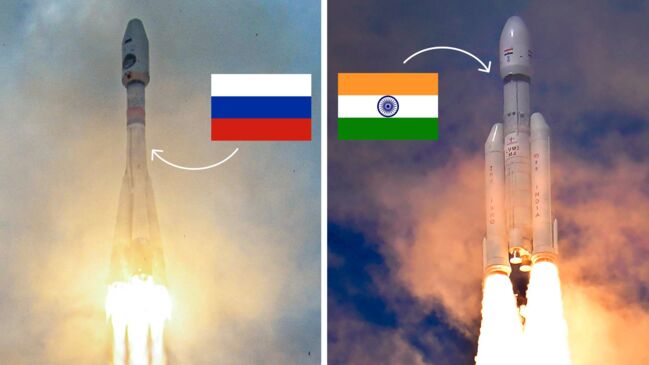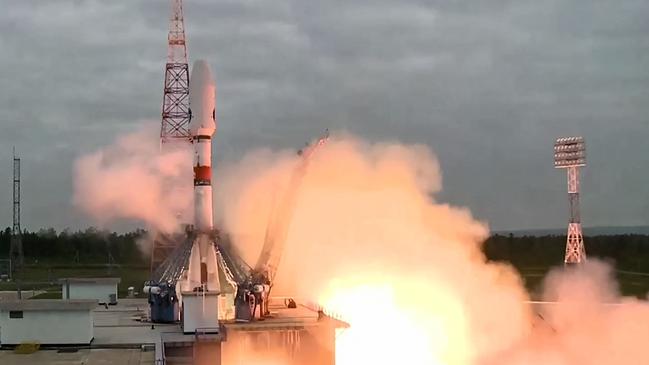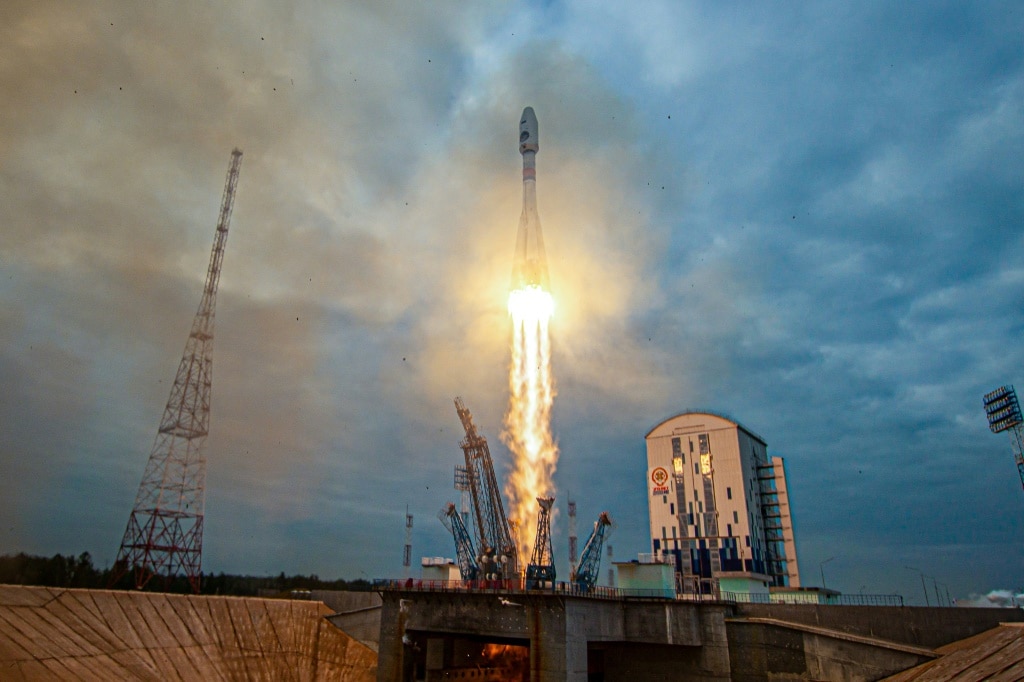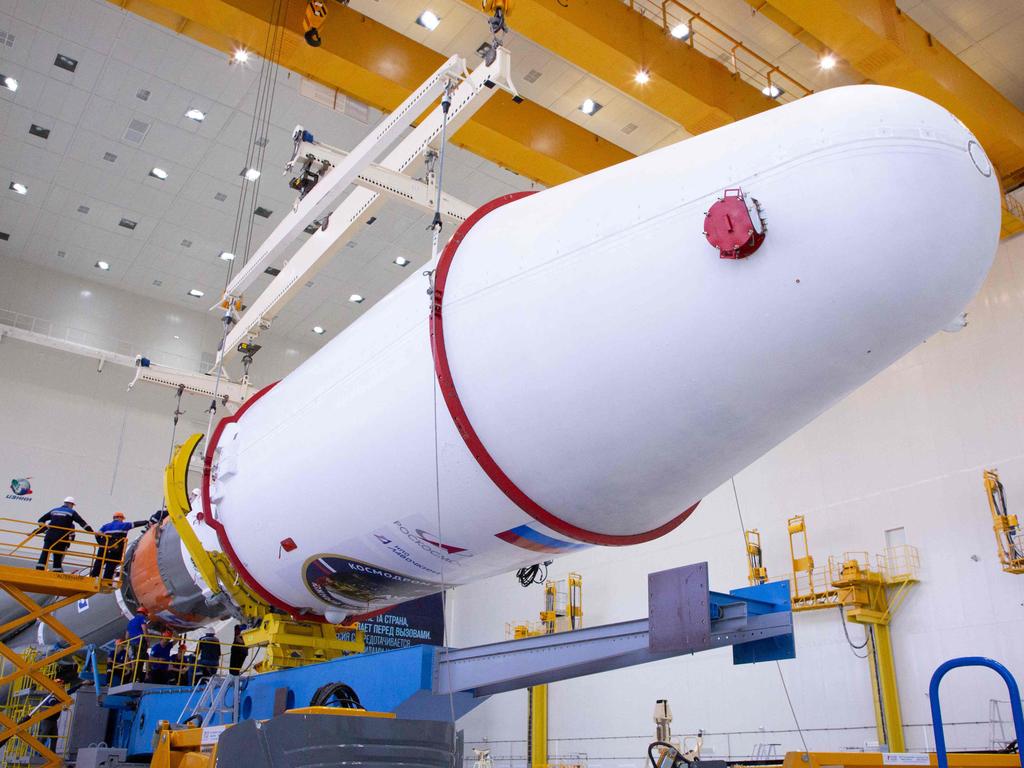Russian space agency says craft ‘has ceased to exist’
Russia’s first mission to the moon in almost 50 years ends in disaster, as its unmanned spacecraft crashes while attempting to land on the unexplored south pole.

Russia’s first mission to the moon in nearly 50 years ended in a disaster as its unmanned Luna-25 spacecraft crashed while attempting to land on the unexplored south pole, Russian authorities said Sunday.
Russia was racing with India to become the first nation to land a rover on the area of the moon that scientists believe could hold water and other elements that could support a human settlement in the future.
The Luna-25 probe was launched on a Soyuz-2.1b rocket on Aug. 11 from the Vostochny Cosmodrome in Russia’s Far East and was supposed to touch down on Aug. 21.
Political and aerospace experts in the West speculated that the international sanctions on Russia following its invasion of Ukraine might have cut off its space program from access to key technologies. A successful operation could have shown that the Kremlin still has technological prowess.
On Saturday, Russia’s state news agency TASS had reported that the Luna-25 faced an “abnormal situation” during a manoeuvre to enter a pre-landing orbit and lost contact with its handlers at about 2.57pm. Moscow time on Saturday.
“The Luna-25 spacecraft switched to an off-design orbit and ceased to exist as a result of a collision with the surface of the moon,” Russia’s space agency, Roscosmos, told TASS.
The planned landing of the probe was supposed to happen before India launched its own Chandrayaan-3 spacecraft, which is scheduled to land in the same area of the moon on Wednesday, according to the Indian Space Research Organization, the country’s space agency.
The moon’s south pole has long been targeted for exploration as a potential area of human settlement in the future.
China, Russia and the U.S. are the only countries to have sent probes to the moon. China safely sent a spacecraft there in 2019. Russia has planned to work with China on a lunar research station.
The moon’s south pole is more challenging for probes to land on, given the area’s craters and boulders, according to space experts. The director of Roscosmos had put the likelihood of success at 70%.
The Soviet Union had a formidable space program, developed amid a space race with the U.S. during the Cold War. The last Soviet craft to land on the moon was Luna-24 in 1976.
The Russian space program has been in decline in recent years as the government shifted funding toward the military industry.
In 2012, Russia’s Phobos-Grunt spacecraft, designed to collect samples from one of Mars’s moons, crashed into the Pacific after becoming stranded in Earth’s orbit for around two months.
President Vladimir Putin said in 2018 that Russia’s leadership in space exploration was under threat, and announced reforms to boost its performance.
Progress was, however, hampered by a string of financing problems and corruption scandals. In 2021, Russia signed an agreement with China to develop a lunar base.

The Soyuz family of carrier rockets, originally developed in the Soviet era, has long been the best-performing part of the Russian space program. With nearly 2,000 launches, including Luna-25, it is the most-used rocket in the history of spaceflight.
For a while, Russia’s Soyuz rockets were the only ones able to ferry crews, including those of the U.S. National Aeronautics and Space Administration, to the International Space Station that orbits the Earth. That changed in 2020, when Elon Musk’s SpaceX company launched its first manned Falcon 9 rocket.
“Russia’s space program has been plagued by problems for decades — among them corruption, low-quality electronics and brain drain — and all these issues have been compounded by the country’s isolation since its invasion of Ukraine,” said Alissa de Carbonnel, deputy program director of the International Crisis Group, a think tank.
“It’s really good at shuttling the Soviet-design Soyuz to and from the space station but that’s about it for the once-mighty space program,” she added. “While satellites fielded by other nations have travelled to the far reaches of the solar system, post-Soviet Russia has made little mark on deep-space exploration.”
The failure of Russia’s flagship space mission, which comes amid an escalating space race between Moscow, the U.S., China and India, is a fresh setback for Putin, who has been struggling to achieve his strategic goals in Ukraine.
China, which along with the U.S. is a leading country in space technology, has agreed to pursue a project to establish a human settlement on the moon together with Russia, but this weekend’s crash of the Luna-25 could mean that Moscow, which is the junior partner in the relationship, has less to offer than originally assumed.
In comments earlier this month, Bill Nelson, the administrator of NASA, said that he wished Russia well in its bid to reach the moon but added that he viewed only China as a competitor to the U.S. in the space race.
“I don’t think that a lot of people at this point would say that Russia is actually ready to be landing cosmonauts on the moon in the time frame that we’re talking about,” Nelson said.
The European Space Agency, the European Union’s equivalent of NASA, originally intended to co-operate with Russia on the lunar landing project and provide its own technology for the probe, but that plan was abandoned due to the invasion of Ukraine.
Establishing a lunar base could be a stepping stone for further space exploration. However, some experts have also raised concerns about a potential military use of any such presence.
Dow Jones







To join the conversation, please log in. Don't have an account? Register
Join the conversation, you are commenting as Logout